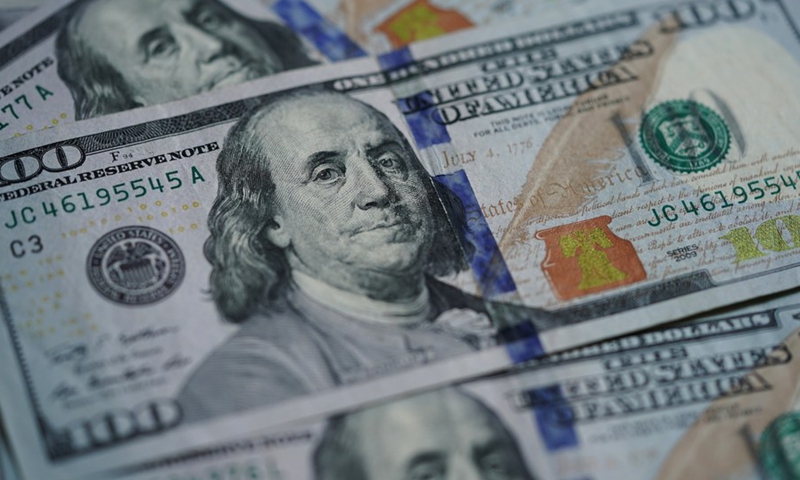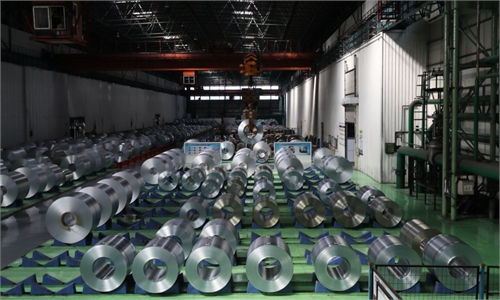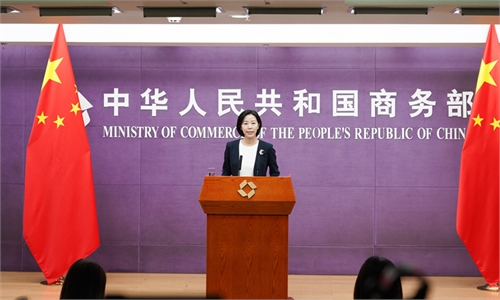US Fed's hawkish tone on tightening sparks global concerns as country becomes 'bomb' for global economy

Photo taken on March 17, 2020 shows U.S. dollar banknotes in Washington, D.C., the United States. Photo: Xinhua
US politicians, including President Joe Biden, and some mainstream media have recently launched a smearing campaign against China's economy, while touting the so-called "Bidenomics"; however, lingering risks in the US economy and Washington's toxic policies have already wreaked havoc and continued to pose grave threat to the global economy, Chinese experts said on Thursday.
In a latest sign of risks in the US economy, Federal Reserve officials have warned of "significant" risks to inflation, which could require more interest rate hikes, according to the minutes of the US central bank's recent policy meeting published on Wednesday. Such a more-hawkish-than-expected tone prompted market expectations that the Fed might continue its aggressive monetary tightening after a brief pause.
Further US interest rate hikes will not only pose risks to its embattled banking sector and its economy as a whole, but also represent a grave threat to the global economy, with many emerging and developing markets potentially facing capital outflows, higher energy costs and greater debt burden, Chinese experts said. In comparison, the Chinese economy, despite facing downward pressure, is expected to be the biggest contributor to global growth, they noted.
At the closely watched Fed meeting from July 25-26, "most participants continued to see significant upside risks to inflation, which could require further tightening of monetary policy," according to the minutes. "Participants remained resolute in their commitment to bring inflation down to the 2% objective."
US officials have been hailing a slowing trend in US inflation, citing a slew of policies, including the so-called Inflation Reduction Act (IRA) of 2022. Biden on Wednesday celebrated the IRA's first anniversary, appearing to be taking a victory lap over lower inflation and unemployment. However, the US' consumer price index remains high above the official target, with a growth of 3.2 percent in July.
Meanwhile, US consumers are continuing to suffer from higher prices. Everyday goods and services cost $709 more per month for US consumers compared to two years ago, according to Moody's Analytics, a research firm. Moreover, despite seemingly solid data, 65 percent of respondents to a recent CBS News poll said the US economy is in "bad" shape, compared to 29 percent who called it "good." More than 60 percent described the US economy as "struggling," and only 34 percent of approve of Biden's performance on the economy. In fact, 50 percent said what comes to mind when they heard "Bidenomics" is high inflation.
"The US economy looks sound on the surface, but there actually is a capital bubble. Once the bubble bursts, economic and financial crises will erupt. The hidden risks have not been rooted out at all," Hu Qimu, deputy secretary general of the digital real economies integration Forum 50, told the Global Times, noting that the US has caused havoc around the world, with unlimited monetary easing first and then aggressive monetary tightening recently, as well as its protectionist trade and investment policies.
Wreaking havoc globally
Since early 2022, US officials began tightening to tame runaway inflation, raising the Fed's benchmark rate to the highest level in 22 years after a rate hike in July. Such an aggressive campaign has not only left many small banks in the US in crisis, but has also contributed greatly to or guaranteed economic crisis for many emerging market economies, analysts said.
"The rapid rise in interest rates in the United States poses a significant challenge to EMDEs [emerging market and developing economies]," the World Bank said in its most recent Global Economic Prospects in June, noting that rapid interest-rate increases of the kind that have been underway in the US over the past year are correlated with a higher likelihood of financial crises in EMDEs.
While it remains unclear whether the Fed will end up raising rates in the coming months, the more-hawkish-than-expected tone of the meeting has already sparked concerns among markets, with US stocks trending downward and the US dollar strengthening following the release of the minutes.
He Weiwen, a senior research fellow at the Center for China and Globalization, said that US interest rates hikes mean a stronger US dollar, which could mean capital outflows, higher energy prices and debt distresses for EMDEs, due to the prevalence of the US dollar in global trade and debt market. "The US cannot shirk its responsibility from debt distress in many developing countries caused by the Fed's interest rate hike and the strengthening of the US dollar," He told the Global Times.
Despite the well-documented track record of the US causing economic turmoil and even crises around the world, US officials and some mainstream media outlets have recently launched another round of smearing campaign against China, while remaining tone deaf of the risks of the US economy. Biden even said that China's economy is a "ticking time bomb," even though he gets the data wrong. Bloomberg, in what appears to be a hatchet job under the title "China sneezes, but will the world catch a cold?" claimed that "the security blanket that Chinese expansion gave to the global economy for the past two decades is being pulled away."
Such rhetoric from US politicians and mainstream media outlets is politically motivated as an already bitter US presidential election cycle is increasingly heating up, Chinese analysts said. Biden, who seeks reelection amid record low approval ratings, is trying to highlight China's challenges, so as to cover up his own failures at home, they said.
"He makes accusations against China so as to divert [domestic] conflicts," Dong Shaopeng, a senior research fellow at the Chongyang Institute for Financial Studies at the Renmin University of China, told the Global Times, adding that despite Biden's protectionist policies to boost US manufacturing and lure high-tech investment, there remains serious problems in the US industries.
In comparison, the Chinese economy, although facing challenges during the recovery process, is still expected to outperform other major economies and remain the biggest contributor to global growth in 2023 and beyond. The IMF, for example, expects China's growth to reach 5.2 percent in 2023, compared to US' 1.8 percent. China's growth will account for one-third of global growth this year, the IMF said.
Noting that the US singlehandedly caused enormous damage on the world economy during the 2008 global financial crisis, He Weiwen said that "the US is not a ticking time bomb, it is a bomb that has already gone off."



